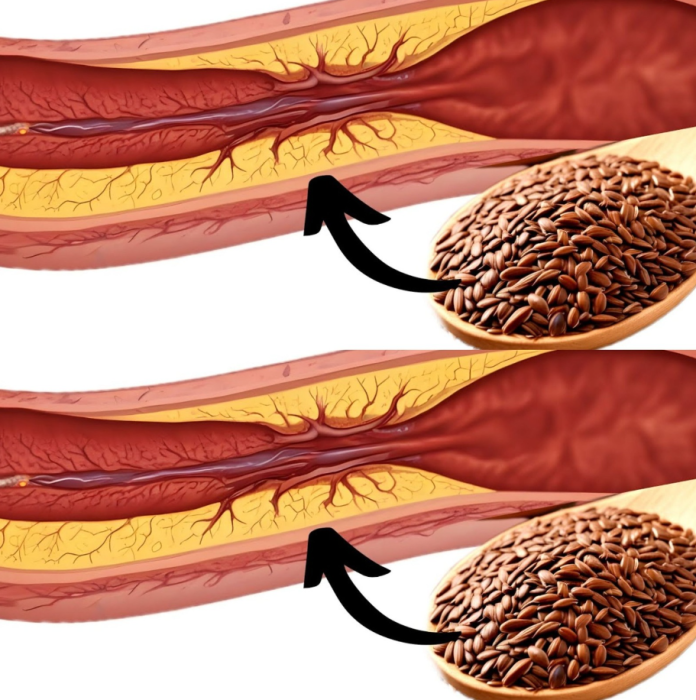In recent years, flaxseed, alternatively known as linseed, has increasingly captivated the interest of health enthusiasts and medical professionals alike due to its promising array of potential health benefits, especially in enhancing cardiovascular well-being. Despite its modest appearance, this tiny seed holds remarkable potential in combating serious conditions such as blood clots, heart attacks, and strokes, making it a standout in preventive health strategies. The simplicity of incorporating just one tablespoon of flaxseed into your daily diet can yield substantial improvements in your cardiovascular health outcomes.
The surge in interest surrounding flaxseed can be attributed to its rich nutritional profile. It is particularly renowned for its high content of omega-3 fatty acids, which are pivotal in reducing inflammation throughout the body, supporting optimal blood pressure levels, and lowering triglyceride concentrations—all critical factors in mitigating the risk of cardiovascular diseases. Furthermore, flaxseed is a powerhouse of dietary fiber, encompassing both soluble and insoluble varieties. Soluble fiber aids in lowering cholesterol levels by binding to bile acids and facilitating their excretion from the body, while insoluble fiber promotes digestive regularity and prevents constipation, contributing to overall gastrointestinal health.
Moreover, flaxseed boasts a significant concentration of antioxidants, primarily lignans, which play a crucial role in shielding the cardiovascular system from oxidative stress. Oxidative stress can accelerate the development of atherosclerosis, a condition characterized by the buildup of plaque in the arteries, thereby increasing the susceptibility to heart attacks and strokes. By neutralizing free radicals and reducing oxidative damage, the antioxidants in flaxseed contribute to the maintenance of arterial health and overall cardiovascular integrity.
As flaxseed continues to gain recognition for its multifaceted benefits, it has become increasingly integrated into heart-healthy diets worldwide. Whether sprinkled over breakfast cereals, incorporated into smoothies, or added to baked goods, this versatile seed offers a convenient means of enhancing daily nutrition without requiring drastic dietary changes. Embracing flaxseed as a dietary staple not only empowers individuals to proactively manage their cardiovascular health but also underscores its role as a fundamental component of a balanced and proactive approach to overall wellness.
In conclusion, the burgeoning popularity of flaxseed underscores its pivotal role in promoting cardiovascular health and overall well-being. By incorporating just one tablespoon of flaxseed into your daily dietary regimen, you can harness its potent combination of omega-3 fatty acids, fiber, and antioxidants to fortify your cardiovascular system against potential threats. Embracing this small yet impactful dietary addition represents a proactive step towards safeguarding your heart and optimizing your health in the long term.
Getting Started with Flaxseed
Flaxseed is renowned for its high content of omega-3 fatty acids, which are crucial for heart health. These fatty acids not only lower triglyceride levels and support healthy blood pressure but also play a vital role in reducing inflammation throughout the body. By combating inflammation, omega-3s contribute to the prevention of cardiovascular diseases such as heart attacks and strokes.
Packed with Fiber
One of the key components of flaxseed is its rich fiber content, both soluble and insoluble. Soluble fiber binds to bile acids in the digestive system, helping to lower cholesterol levels by promoting their excretion from the body. On the other hand, insoluble fiber adds bulk to stool, facilitating regular bowel movements and preventing constipation. Together, these fibers support heart health and promote a healthy digestive system.
Powerhouse of Antioxidants
Flaxseed contains lignans, which are potent antioxidants that contribute to heart health by preventing oxidative stress. Oxidative stress can lead to the development of atherosclerosis, a condition where arteries narrow due to the buildup of plaque, increasing the risk of heart attacks and strokes. Lignans help counteract this process, providing further protection to the cardiovascular system.
Methods for Using Flaxseed
Incorporating flaxseed into your diet is simple and versatile. You can grind flaxseed and sprinkle it over your morning cereal, yogurt, or blend it into smoothies. It can also be added to baked goods like muffins or bread for an extra nutritional boost. Grinding flaxseed enhances the absorption of its nutrients, making it easier for your body to derive the maximum benefits.
Conclusion :
By incorporating just one tablespoon of flaxseed into your daily diet, you open the door to significant improvements in your heart health while simultaneously lowering the risk of developing serious cardiovascular conditions such as blood clots, heart attacks, and strokes. The synergistic combination of omega-3 fatty acids, fiber, and antioxidants found abundantly in flaxseed makes it a formidable tool in promoting cardiovascular wellness. Omega-3 fatty acids are renowned for their ability to reduce inflammation, lower triglyceride levels, and maintain optimal blood pressure, all of which are crucial factors in preventing heart disease. The fiber content, both soluble and insoluble, supports heart health by aiding in cholesterol management and promoting regular bowel movements, which contribute to overall digestive health. Additionally, the antioxidants, particularly lignans, help combat oxidative stress and protect the arteries from plaque buildup, thereby reducing the risk of atherosclerosis and its associated cardiovascular complications.
Delaying the adoption of this simple yet powerful dietary change means potentially missing out on substantial health benefits. Embracing flaxseed as part of your daily routine empowers you to take proactive steps towards a healthier life. Whether you sprinkle ground flaxseed over your morning yogurt or blend it into your favorite smoothie, integrating this nutritious seed into your meals is a practical and accessible way to enhance your cardiovascular wellness. By consistently incorporating flaxseed into your diet, you not only fortify your heart against disease but also support your overall well-being. Don’t underestimate the impact of this small adjustment—it could be the key to maintaining a healthy heart and enjoying a higher quality of life for years to come.
Source of the picture : Barbara O’Neill Lectures










